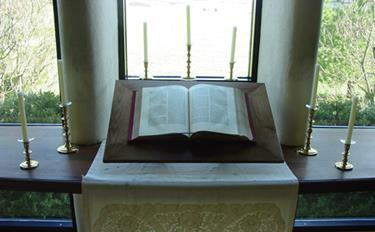Sunday Worship
What Spiritual States do our Rituals Represent?
Why do we have seven candles around the Word?
And I turned to see the voice that spoke with me; and, having turned, I saw seven golden lampstands, and in the midst of the seven lampstands One like the Son of Man. (Revelation 1:12–13)
AR 43. And having turned, I saw seven golden lampstands, signifies the New Church, which will be in enlightenment from the Lord out of the Word. That the “seven lampstands” are the seven churches, is said in the last verse of Rev. 1; and that by the seven churches are meant all who are in the Christian world, and draw near to the church, may be seen above (n. 10); and in particular according to the state of reception of each (n. 41). The reason why the New Church is meant by “the seven lamp-stands” is, because in the Church, and in the midst of it, is the Lord; for it is said, that “in the midst of the seven lampstands he saw one like the Son of man,” and by “the Son of man” is meant the Lord as to the Word. The lampstands were seen to be golden, because gold signifies good, and every church is a church from good which is formed by truths; that “gold” signifies good, will be seen in what follows.
Why do we kneel to pray?
AC 4215:2. There is a correspondence of the thoughts and affections with the actions and gestures of the body… For humiliation of heart produces kneeling, which is an external gesture of the body; humiliation still greater and more internal produces prostration to the earth; gladness of heart and joy of mind produce singing and joyful shouting; sadness and internal mourning produce weeping and wailing; but conjunction from affection produces kissing.
Why do we pray?
Ask, and it shall be given you; seek, and you shall find; knock, and it shall be opened unto you. For everyone who asks, receives; and he who seeks, finds; and to him who knocks, it shall be opened. (Matthew 7:7–8)
AR 376. It is common in all Divine worship that man should first will, desire, and pray, and the Lord then answer, inform, and do. Otherwise man does not receive anything Divine.
AC 2535. Prayer, regarded in itself, is speech with God, and some internal view at the time of the matters of the prayer, to which there answers something like an influx into the perception or thought of the mind, so that there is a certain opening of the man’s interiors toward God. But this takes place with a difference according to the man’s state, and according to the essence of the subject of the prayer. If the man prays from love and faith, and for only heavenly and spiritual things, there then comes forth in the prayer something like a revelation, which is manifested in the affection of him who prays as hope, consolation, or a certain inward joy.
AC 8179:3. Those who are in temptations, and not in some other active life than that of prayers, do not know that if the temptations were interrupted before they had been fully carried through, they would not be prepared for heaven, and thus could not be saved. For this reason, moreover, the prayers of those who are in temptations are but little heard. For the Lord wills the end, which is the salvation of the man, and He knows this end, but the man does not; and the Lord does not heed prayers that are contrary to the end, which is salvation.
He who conquers in temptations is also confirmed in this truth, whereas he who does not conquer entertains a doubt about the Divine aid and power, because he is not heard. And then sometimes, because he slackens his hand, he partly yields.
From all this it can be seen what is meant by there being no need of intercession, namely, that prayer is not to be relied upon. For in prayer from the Divine, it is always thought and believed that the Lord alone knows whether it is profitable or not, and therefore the suppliant submits the hearing to the Lord, and immediately afterward prays that the will of the Lord, and not his own, may be done, according to the Lord’s words in His own most grievous temptation at Gethsemane (Matt. 26:39, 42, 44).
Points to Consider
- What do the seven golden lampstands around the Son of Man represent?
- Does it seem that it would be preferable to prostrate yourself rather than simply kneel, half sitting, as we do? Or is prostration something more appropriate to private worship in our culture? Note that the Lord also says, “When you stand praying….” (Mark 11:25). What does this indicate about our position when praying?
- What can prayer accomplish? Why do we need to pray?
- What does it imply “that prayer is not to be relied upon”?
- Why is our translation of the Lord’s Prayer different from the way it is said in other churches?
- Why do we say the Lord’s Prayer at every service?
AC 6476. Whenever I have been reading [or saying] the Lord’s prayer, I have plainly perceived an elevation toward the Lord which was like an attraction, and at the same time my ideas were open, and from this a communication with some societies in heaven took place. And I noticed that there was an influx from the Lord into every detail of the prayer, thus into every idea of my thought that was from the meaning of the things in the prayer. The influx was made with inexpressible variety, that is, not the same at one time as another. From this it was also made evident how infinite are the things contained in the prayer, and that the Lord is present in every one of them.
| previous |  |
next |
|---|


